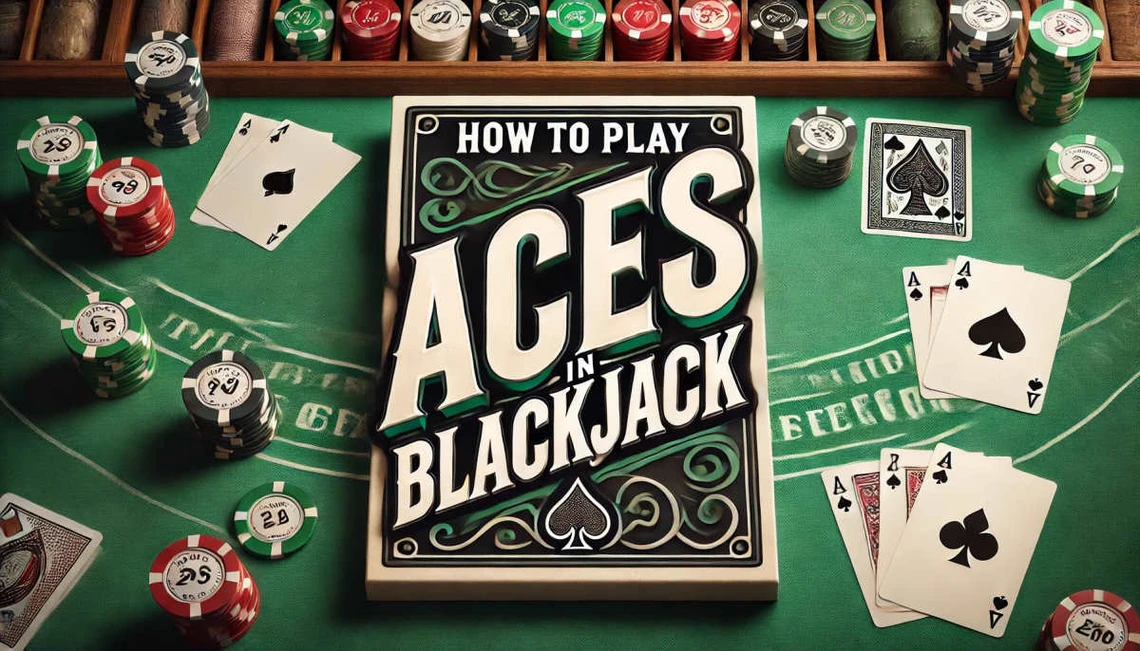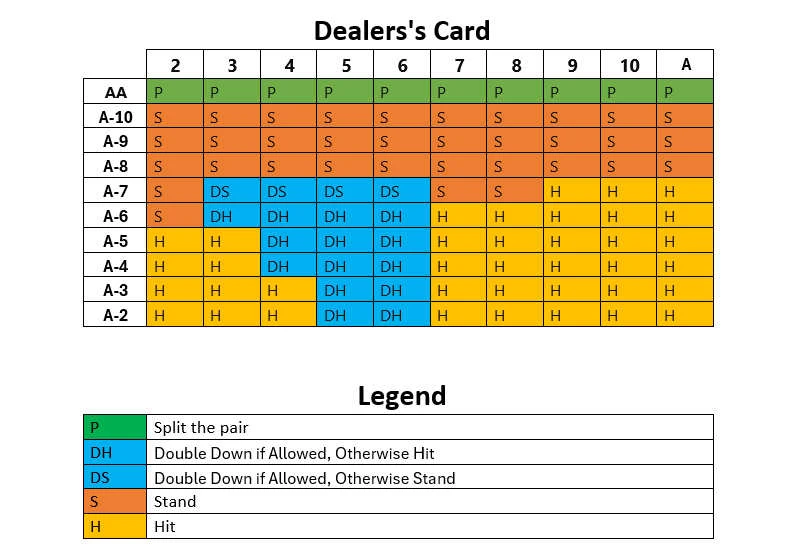
How to Play Aces in Blackjack?

In the game of blackjack, no card holds more potential or power than the ace. Its unique ability to be valued as either 1 or 11 makes it a cornerstone of strong hands and strategic play. Whether you're dealt an ace alongside a face card for an instant blackjack or using it to avoid busting, the ace can be the difference between winning and losing.
Understanding how to play aces is crucial for any blackjack player. This article will guide you through the strategies and decisions that can help you maximize the potential of aces.
What is the Value of Aces in Blackjack?
Aces are the most versatile cards in blackjack, and understanding their dual nature is key to knowing how much is an ace and mastering the game.
Dual Value of Aces
- Aces can be worth either 1 or 11 points : This dual value allows the ace to adapt to various situations, offering players flexibility in building strong hands. When an ace is valued as 11, it contributes to a higher hand total, but if that total risks going over 21, the ace can be adjusted to 1, avoiding a bust.
Impact on Hand Strength
A hard hand is one where the ace counts as 1, while a soft hand counts the ace as 11. The distinction between soft and hard hands is important because soft hands offer more flexibility, while hard hands are more rigid and prone to busting.
- Strong Hand Scenarios: An ace paired with a 10-point card (like a King) forms a blackjack, the strongest hand possible. In other cases, an ace and an 8 can be a powerful soft hand, allowing players to draw more cards with less risk.
- Saving from Busting: If you’re dealt an ace with a higher hand total, the ace can shift from 11 to 1, lowering the total and preventing a bust. This ability to adjust the ace’s value makes it a vital card in managing risk and enhancing hand strength.
Playing Aces in Different Scenarios
Aces as Part of a Hard Hand
A hard hand in blackjack is when the ace in your hand is counted as 1. This typically happens when counting the ace as 11 would push your total over 21, causing you to bust.
- When to Hit: If you have a low total (e.g., 12 or 13) with an ace counted as 1, it's generally advisable to hit to increase your hand's value.
- When to Stand: If your hard hand totals 17 or more, it's often best to stand, as the risk of busting with another card is high.
- When to Double Down: Consider doubling down when you have a hard 9, 10, or 11, and the dealer shows a weak upcard (like a 4, 5, or 6).
Aces as Part of a Soft Hand
A soft hand is when the ace is counted as 11. This hand is "soft" because it cannot bust with the addition of another card—the ace can be adjusted to count as 1 if necessary.
- When to Hit: Soft hands (like Ace-6 or Ace-7) are ideal for hitting since the ace's flexibility allows you to draw cards with minimal risk.
- When to Stand: If you have a soft 19 or higher, standing is typically the best move, as the chance of improving your hand further is slim.
- When to Double Down: Soft hands like Ace-6 or Ace-7 are good candidates for doubling down, especially against a dealer showing a weaker upcard (like a 5 or 6).
When the Dealer Has an Ace
When the dealer shows an ace, they have a strong chance of hitting a blackjack or a strong hand, putting the player at a disadvantage.
- Insurance Decision: The dealer's ace often prompts an insurance offer. However, statistically, it's usually better to decline insurance as it has a higher house edge.
- Hit More Cautiously: When the dealer has an ace, consider playing more cautiously with hard hands, avoiding aggressive hits that could lead to busting.
- Doubling Down: Be more conservative about doubling down, as the dealer's strong upcard reduces your chances of winning with a single additional card.
- Splitting : If you have a pair, it's still advisable to split them, even against a dealer's ace, as this gives you two chances to build strong hands.
What Happens If the Dealer Has Two Aces?
- The dealer’s first ace will always be worth 11 unless this will bust the hand. Therefore, if the dealer has two aces in blackjack, the second ace and any subsequent aces will be worth 1
Importance of Splitting Aces
Splitting is one of the most crucial strategies in blackjack, offering players the chance to turn a potentially strong hand into two winning opportunities
Optimal Situations for Splitting Aces
- General Guideline: You should always split aces, regardless of the dealer's upcard. The potential to create two powerful hands outweighs the risk, even when the dealer shows a strong card like a 10 or an ace.
- When Not to Split (Exceptions): In very rare situations, if specific table rules allow doubling down after splitting aces, and the dealer has a very weak upcard (like a 5 or 6), some players might consider not splitting. However, this is generally discouraged because splitting aces is almost universally the best play.
Why Split Aces?
Splitting aces increases the chances of forming strong hands in blackjack by turning one hand into two, each starting with an ace.
- Rule Limitation: Many casinos limit the benefit by allowing only one additional card per split ace, but it remains a strong strategy.
Can You Split Aces Twice in Blackjack?
- When playing blackjack, players can usually only split aces once during a single game. However, some land-based Las Vegas casinos and some online casinos allow players to split aces twice, so always double-check the casino’s specific rules. For example, this is possible in the Atlantic City Blackjack variant.
Chart for playing aces in blackjack
Here's a quick reference table to help you make the best decisions when playing aces in blackjack.

Check out our article on Blackjack charts if you want to know how to play other hands.
Common Mistakes When Playing Aces
Avoiding common mistakes with aces is crucial for maximizing their value and improving your blackjack strategy.
- Overvaluing Aces : Players often overestimate aces, assuming they guarantee a strong hand, leading to risky decisions. An ace's strength depends on the overall hand, so overreliance can backfire.
- Failing to Split Aces : Not splitting aces limits your hand's potential and often leads to a weaker total. Splitting them increases your chances of forming strong hands and is key to maximizing your winning potential.
- Ignoring the Dealer’s Upcard : Many players overlook the dealer's upcard when playing aces, leading to poor decisions and missed opportunities. It's crucial to consider the dealer’s upcard when deciding whether to hit, stand, or double down.
Conclusion
To conclude, aces can be worth either 1 or 11, depending on the total value of your hand. This means that aces are an incredibly powerful card in blackjack, regardless of whether you are playing online or in a land-based casino. Therefore, by playing aces carefully, players can greatly increase their chances of winning a blackjack game.
Final Advice: Consistently split aces, consider the dealer’s upcard in your decisions, and stay mindful of the risks to make the most of this powerful card in every game.
To play aces effectively in blackjack, remember their dual value and how they can strengthen both hard and soft hands. Always split aces to maximize your winning potential and avoid common mistakes like overvaluing or ignoring the dealer’s upcard.

Author
Content Writer